One of the most outrageous, blood-boiling aspects of ‘modern’ political culture is the shocking levels of intellectual dishonesty found among people who claim moral high ground as ‘campaigners for human rights’.
I’ve written before about the Israeli group that calls itself ‘Breaking the Silence’. Let me remind you, in just one sentence:
“Fair disclosure: I despise Breaking the Silence. It’s not that they hold opinions that are very different from mine; frankly [sigh], a lot of people hold opinions very different from mine! Much as I disagree with them, these BtS chaps are entitled to their opinion; they are even entitled to promote those opinions and try to persuade others. But the way they go about it is, in my view, thoroughly anti-democratic and intellectually dishonest.”
I’ve also written (and not in very complimentary terms, either) about the British group which calls itself ‘Yachad’:
“In Hebrew, Yachad means ‘together’. Nice name; but the reality is, these days, that Yachad is ‘together’ with those who target Jews – and only Jews – for boycott.”
The two groups – Breaking the Silence and Yachad – have been working together for years. And one of the main areas of collaboration is taking British Jews on indoctrination tours – especially to the city of Hebron, in the West Bank.
Why Hebron? Not because, as Yachad dishonestly claims, it’s “a microcosm of occupation”. Quite the opposite: rather than being ‘typical’ – as Yachad and BtS would like people to think – Hebron is the worst place in the West Bank. That’s because some of the most extreme Israelis live in close proximity to some of the most extreme Palestinians. Agreements have been implemented, which have by-and-large pacified the area and saved lives. But those same agreements give duplicitous groups like Yachad and BtS an opportunity to bash Israel.
The advert
So, if that’s been going on for a while, why am I writing about it now? Well, because after the latest such tour, BtS and Yachad have managed to get some free advertising (I am not convinced that it was indeed free; i.e. that no money or other benefits changed hands; but let’s assume it was) from the pages of Jewish News – a British Jewish outlet associated with Times of Israel. The author is a certain Lee Harpin and his article is entitled “We must fix this for the settlers, soldiers and the Palestinians”.
So that’s why I write about this now: to take apart this disingenuous piece of anti-Israel propaganda and wipe the floor with it. Sure, people have the right to criticise my country; but, if they do it with ill-will, duplicity or dishonesty, I have the right to expose those rather unpleasant traits.
The first thing I asked myself as I started to read Mr. Harpin’s piece was: who exactly is ‘we’? If Harpin were an Israeli citizen writing in Hebrew for an Israeli audience (for instance for Ha’aretz, who may be willing to have him), all would be clear and legitimate. Israelis (read: people who live, pay taxes, vote and put their arses on the line in Israel) have every right to express opinions and try to persuade other Israelis that theirs are the best opinions in town. But Mr. Harpin isn’t Israeli; he writes in English for a British audience – i.e. people who live, pay taxes and vote in the United Kingdom. If they are the ’we’, then it’s entirely unclear why “we must fix” anything at all more than 2,000 miles away from where “we” live.
The article’s strapline is no less ‘interesting’:
“Controversial Israeli group Breaking The Silence attracts increasing numbers of diaspora Jews onto its 'occupation tour' in West Bank cities like Hebron.”
And below, still in bold typeface:
“Israeli human rights groups such as Breaking The Silence (BTS) are reporting an increase in bookings from diaspora Jews for ‘occupation tours’ of West Bank cities like Hebron to witness for themselves the situation faced by Palestinians.”
And again, this time in the body of the article, coming from Danielle Bett, a Yachad spokesperson:
“More and more diaspora Jews are visiting the West Bank…”
Well, methinks thou dost protest too much, Mr. Harpin: much as I scoured the rest of the article, I could find no clue what the reported “increase in bookings” was. Which is ‘a bit’ odd: self-respecting journalists don’t write vague statements bereft of any substance.
And what exactly is the term of reference for that “increase”? If it’s 2020 or 2021, then Mr. Harpin must be, technically-speaking, correct – and ethically-speaking beyond contempt. It’s obvious that, if we compare 2022 with the pandemic years, there was a sharp increase in all travel; not just in “occupation tours” to “West Bank cities”, but also in tourism to Timbuktu and Phnom Penh…
And how many Diaspora Jews is “more and more”? From 8 to 10 – now that’s a whopping 25% growth; but it would be utterly misleading to report “an increase” based on such insignificant numbers...
Let me be clear: I am very suspicious of journalists (or ‘journalists’) who write in this manner: without numbers to support them, such statements amount to subliminal adverts dressed up as ‘news’ and unethically ‘fed’ to the unsuspecting reader.
Journalism?
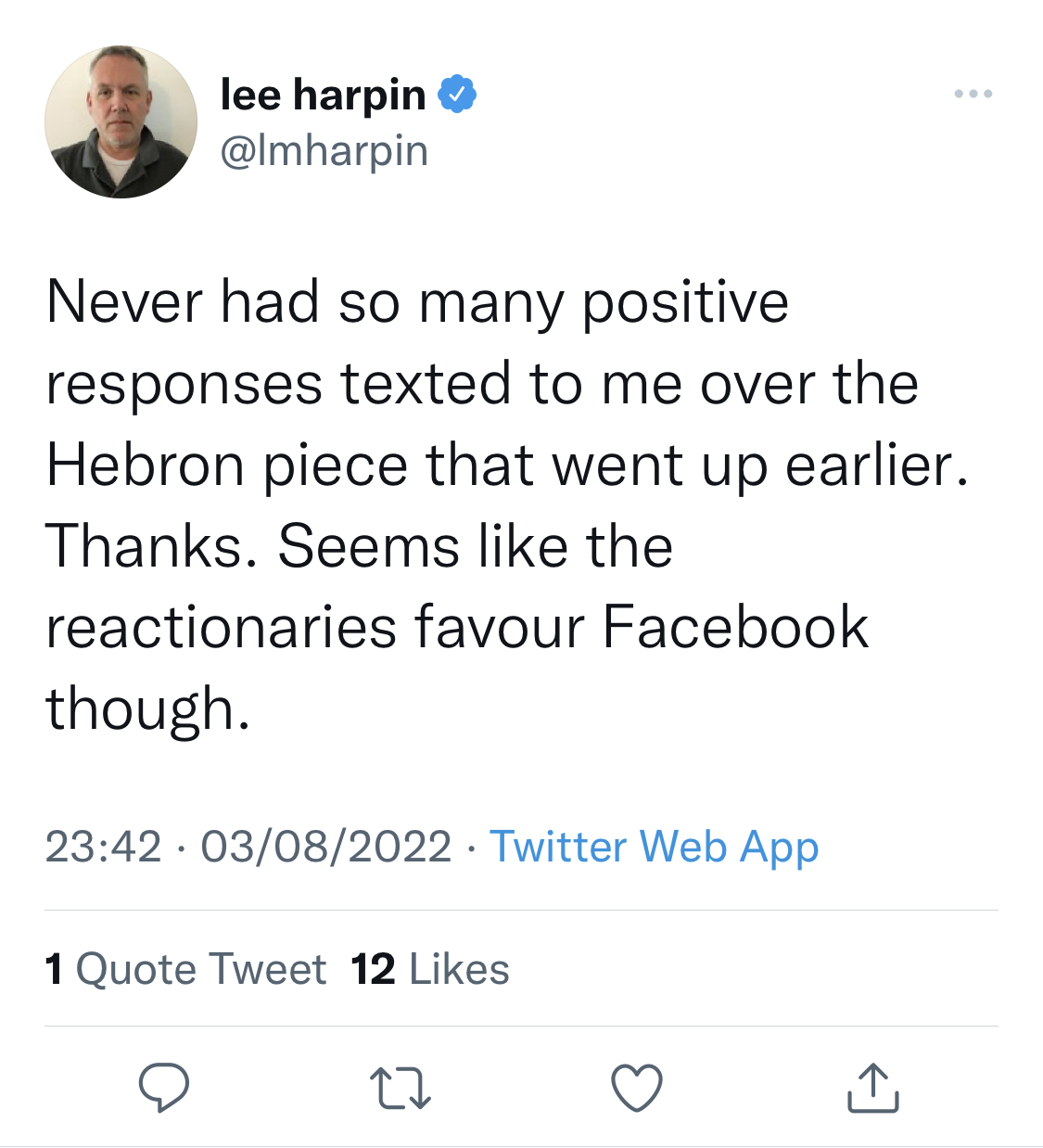 |
| If one disagrees with Lee Harpin and criticises his views, one is a 'reactionary'. Well, I'm going to call those in his camp (including Yachad and BtS) 'the harpins'. No, not 'an eye for an eye', just contempt for contempt. |
But let’s go back to Mr. Harpin’s latest ‘journalistic’ contribution:
He begins by giving a broad platform to the BtS ‘tour guide’. That’s Amir Ziv, the group’s so-called ‘Pedagogy Coordinator’ (‘pedagogy’ sounds so much better than ‘propaganda’ or ‘brainwashing’, doesn’t it? But it is also indicative of a certain attitude…)
After being so vague about the alleged “increase in bookings”, Harpin suddenly decides to be amazingly precise when reciting Amir’s ‘credentials’:
“[He] had served three years in the IDF, with the 50th battalion of the Nahal Brigade in Hebron and Gaza”.
Such military track record may sound impressive to Diaspora Jews with no experience of army service. But most Israelis would shrug: millions of them served in the IDF – the males typically for three years. Of course, Amir did not spend three years in Hebron and Gaza – that’s just Harpin’s journalistic sleight of hand; no Israeli soldier did: garrisoning and anti-terror activity in the West Bank is just a relatively small part of IDF’s mission. Like so many Israelis, I also served in Hebron (and Nablus, and Ramallah and a handful of other ‘nice’ places). In total, I spent there many months, including as a reservist, at the height of the intifada. I have quite a few stories to tell – but they’re not the kind of stories Breaking the Silence or Yachad are interested in; they’ll never publish my testimony, nor will they invite me to guide their tours.
So, a word of warning: yes, Amir Ziv served in the IDF, like most Jewish Israelis; but no, that does not mean ‘he knows what he’s talking about’. Amir is an outlier; listen to any of his comrades and you’ll hear a completely different story.
Anyone who ever listened to a Breaking the Silence presentation knows how one-sided their tales are. But Lee Harpin wants us to believe that dear ol’s Amir gives a balanced, sane account, which also highlights Israeli suffering:
“Standing beside a memorial plaque in downtown Hebron to Gadi and Dina Levi – a couple expecting the birth of their first child, who were killed by a Palestinian terrorist wearing a bomb while they were on their way to pray at the nearby Cave of the Patriarchs in 2003 – Amir opened up about the impact of violence, having recently become the father of a baby girl.
Recalling another Palestinian sniper attack in the same area, which killed a young child, he said: ‘Each death, each attack, each time you see violence… it pushed me further away into the realisation we need to fix this. It won’t stop on its own, we have to end it, for the settlers, and soldiers who come here, and for the Palestinians.’”
You got that? All Amir wants you to do is to help everybody: ‘settlers’, soldiers and Palestinians. And how can “we” do that? Why, by bashing Israel, of course!
Imagine that, after the Manchester Arena bombing, a British political advocacy group told a group of Israeli tourists that they must apply pressure on the British government in order “to fix this” for the benefit of all: innocent kids attending a concert, police, Muslims... I dare say that the vast majority of Brits (including most British Muslims) would take a rather dim view of such ‘human rights advocacy’.
But this is all just the beginning. Next, Amir goes on to describe what, in his enlightened opinion, are the two things “we need to keep in the back of our mind about Hebron”: 1) the 1929 massacre and 2) the Goldstein massacre.
The juxtaposition of the two events is an attempt to hoodwink people into believing that they are similar. Of course, they were both criminal, disgusting acts. But otherwise, they had nothing in common.
The pogrom
The 1929 Hebron Massacre was a pogrom perpetrated by large mobs of Arabs against the local Jewish community – a community that lived in the city for centuries, alongside their Arab neighbours. Organised in groups of hundreds of men armed with swords, axes and knives, the Arab rioters attacked Jewish houses, synagogues and businesses, murdering and pillaging. They were joined by some Arab policemen. Two local rabbis noted, however, that there were also a score of Arab families who saved Jews by offering them shelter in their homes.
But the only one who actually confronted the murderers and tried to stop them was British Superintendent Raymond Cafferata, the commander of the local police force. Here's part of his testimony:
“On hearing screams in a room, I went up a sort of tunnel passage and saw an Arab in the act of cutting off a child's head with a sword. He had already hit him and was having another cut, but on seeing me he tried to aim the stroke at me, but missed; he was practically on the muzzle of my rifle. I shot him low in the groin. Behind him was a Jewish woman smothered in blood with a man I recognized as a police constable named Issa Sheriff from Jaffa. He was standing over the woman with a dagger in his hand. He saw me and bolted into a room close by and tried to shut me out-shouting in Arabic, ‘Your Honor, I am a policeman.’ […] I got into the room and shot him.”
A British inquiry later established:
“About 9 o'clock on the morning of the 24th of August, Arabs in Hebron made a most ferocious attack on the Jewish ghetto and on isolated Jewish houses lying outside the crowded quarters of the town. More than 60 Jews – including many women and children – were murdered and more than 50 were wounded. This savage attack, of which no condemnation could be too severe, was accompanied by wanton destruction and looting. Jewish synagogues were desecrated, a Jewish hospital, which had provided treatment for Arabs, was attacked and ransacked, and only the exceptional personal courage displayed by Mr. Cafferata – the one British Police Officer in the town – prevented the outbreak from developing into a general massacre of the Jews in Hebron.”
The British authorities imposed a fine on the entire city of Hebron. Sheik Taleb Markah, a member of the local Arab Executive Committee, was found guilty of inciting the riots – and imprisoned for two years. But not before the British judges had to take over the cross-examination of the accused – noting that the Arab prosecutor had no interest in... prosecuting.
The Hebron pogrom was part of the August 1929 anti-Jewish riots, which were incited by the Grand Mufti of Jerusalem and his Supreme Muslim Council. They cost the lives of 133 Jews.
Back to Mr. Harpin’s article, which – after providing a brief description of the massacre, notes that:
“For the British Mandate, the massacre was confirmation that Jewish existence in Hebron should be brought to an end. The Jews were removed from the area, and placed to begin with in refugee camps.”
In other words: problem – Jews are massacred by Arabs; solution – ethnically cleanse the Jews!
I wonder if Lee Harpin would write with such royal equanimity if Israel were to apply the same kind of ‘conflict resolution’ methodology?
But there’s more than mere equanimity there: kicking the Jews out of Hebron (and the West Bank, and East Jerusalem) is precisely the ‘solution’ advocated by the likes of Yachad and BtS; as well as by Fatah, Hamas and the Islamic Jihad of Palestine.
The ‘Jewish’ terrorist
Now let’s turn our attention to ‘the second thing’ – the event that Amir Ziv tries to ‘sell’ people as a sort of ‘counterbalance’ to the Hebron pogrom.
On 25 February 1994, a ‘man’ called Baruch Goldstein entered an area of Hebron’s Cave of the Patriarchs employed as a mosque. He opened fire and murdered 29 Palestinians, before being overpowered and killed himself.
Baruch Goldstein mass-murdered innocent, unarmed, defenceless people. So why do I claim that his horrific act and the 1929 massacre have nothing in common?
Because – however disgusting – Goldstein’s terrorist attack was the act of one individual. An act condemned in no uncertain terms by the vast majority of the Jewish population in Israel and the Diaspora – and by the entirety of Israel’s political class.
In the aftermath of the crime, Israeli Prime Minister Yitzhak Rabin telephoned Yasser Arafat to express condolences and his disgust for the "loathsome, criminal act of murder". In a Knesset speech, he addressed Goldstein and any of his ilk thus:
“You are not part of the community of Israel... You are not part of the national democratic camp which we all belong to in this house, and many of the people despise you. You are not partners in the Zionist enterprise. You are a foreign implant. You are an errant weed. Sensible Judaism spits you out. You placed yourself outside the wall of Jewish law ... We say to this horrible man and those like him: you are a shame on Zionism and an embarrassment to Judaism."
Then Leader of the Opposition Benjamin Netanyahu also unequivocally condemned Goldstein’s act (no ifs, no buts), calling it a “despicable crime”.
The Yesha Council (the political representatives of Israeli ‘settlers’) called the act "not Jewish, not human".
The Israeli government immediately outlawed Kach, the organisation to which Goldstein belonged. Several of its members were placed in administrative detention.
The government also appointed a commission of inquiry headed by then president of the Supreme Court, Judge Meir Shamgar. While describing the massacre as “a base and murderous act, in which innocent people bending in prayer to their maker were killed," the commission found that Goldstein had planned and perpetrated the massacre alone, not telling anyone about his intentions.
The religious establishment in Israel condemned the act with disgust. The Sephardi Chief Rabbi was the first to suggest that Goldstein should be buried outside the cemetery, saying:
"I am simply ashamed that a Jew carried out such a villainous and irresponsible act"
In condemning the act, Ashkenazi Chief Rabbi Yisrael Meir Lau used the expression ‘khilul HaShem’ "a desecration of God's name".
Rabbi Yehuda Amital of Gush Etzion (an area of Jewish settlement in the West Bank) said Goldstein had "besmirched the Jewish nation and the Torah".
The indoctrination tour continues
Far be it from me to try and excuse in any way the Cave of the Patriarchs massacre. Like the vast majority of Israelis, I was absolutely shocked by it and am ashamed that a Jew could do something this evil. I’ll seek no excuse and countenance no forgiveness for the murderer. May he rot in hell!
But an individual act, however horrific, does not belong in the same category as massacres perpetrated by multitudes. Especially when the former was condemned in the harshest possible terms by anyone of any consequence in Israel – while the latter was, on the contrary, incited by the Palestinian leadership of the time, and never condemned by the current leaders.
To present the two crimes as similar or equivalent shows, at best, lack of moral compass; and at worst, an intention to deceive.
In describing the Goldstein massacre, Mr. Harpin somehow ‘forgets’ to mention that it was met with wall-to-wall condemnation in Israel; instead, he merely says that it was “condemned globally by Jewish leaders”. Why? I suspect this is because Mr. Harpin (like BtS and like Yachad) is intent on portraying Israel as violent, callous, even racist.
That’s why, while ignoring those many condemnations, he decides to focus on ‘stories’ that are selected for their anti-Israel propaganda value:
“On the day of our visit, last month, we counted 64 stones placed on Goldstein’s grave, some almost certainly by visitors earlier that day, who clearly wanted to pay their respects to him.
‘He gave his life for the people of Israel, its Torah and land,’ state the Hebrew words on his tomb.”
Unsuspecting youngsters brought on these indoctrination tours may be fooled into believing that there’s lots of support and approval in Israel for Goldstein and his murderous act. But there isn’t: as demonstrated in opinion polls, the vast majority of Israelis were disgusted by Goldstein’s unconscionable act.
The harpins’ ‘spiel’ is to highlight the rare exception and pretend it’s the rule. There is, of course, no reason whatsoever to believe that the 64 stones (or “some” of them) were placed there “almost certainly by visitors earlier that day”. Nothing, in fact, could be less certain: these ‘visitation stones’ tend to accumulate in time – perhaps for years. As for the inscription – shameful as I find it – it was worded and paid for by Goldstein’s family and friends; not by the Israeli state, the Israeli government or the Israeli people.
It's true that there are conspiracy theories according to which Goldstein did what he did to prevent a terror attack only he knew about. It’s also, unfortunately, true that there are a few extremists who – as extremists do – believe in those theories; but to suggest that they’re more than a tiny fringe of nutters despised by the vast majority of Israelis is a form of libel.
 |
| In accordance with the law forbidding the construction of monuments dedicated to terrorists, the Israeli police demolished the shrine built by Goldstein's family and supporters. |
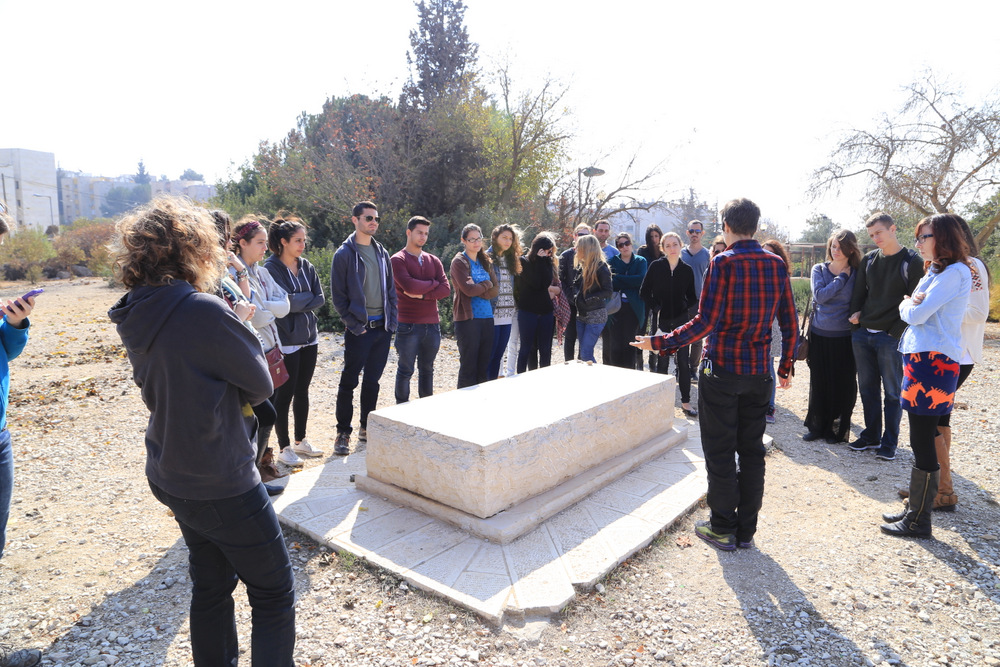 |
| What was left, in the middle of nowhere, is just the grave itself and the funeral stone, which according to Jewish tradition should never be disturbed. The group around the grave is, by the way, another indoctrination tour, run by B'tselem. It is possible that Breaking the Silence, Yachad, B'tselem et al. bring more 'tourists' to the site than Goldstein's few supporters! |
Even more important than what Harpin chooses to write is what he disingenuously chooses to hide: Goldstein’s forlorn grave sits outside any Jewish cemetery. His family and his few supporters wanted to bury him in Hebron’s old Jewish Cemetery; they were denied. They then built around the grave what amounted to a shrine: a small plaza paved with flagstones, complete with decorative lanterns, a few benches, etc. But the Israeli parliament (the Knesset) adopted a law prohibiting monuments to terrorists. The law was enforced by demolishing the entire structure, except the grave itself and the funeral stone – which in Jewish tradition cannot be disturbed.
Compare this with the Palestinian Authority, which celebrates terrorists as ‘martyrs’ and names streets and schools after them; and which pays pensions to their families. Needless to say, this little ‘detail’ is never part of Amir Ziv’s ‘balanced’ presentations – nor apparently did it merit a mention in Lee Harpin’s hatchet job.
We are NOT all Kahane!
But – hold on – doesn’t Israel do the same? After all, Lee Harpin informs us that
“Earlier on our tour we had stopped in Kahane Park, named after Rabbi Meir Kahane, the ultra-nationalist politician who co-founded the Jewish Defence League, who served a term in the Knesset before being convicted of terrorism, and was assassinated in 1990.”
Firstly – much as I abhor the man – Meir Kahane was never convicted of actually committing an act of terrorism; though he was indeed convicted in the US (and given a 5-year suspended prison sentence, as well as a $5,000 fine) for conspiring to manufacture explosives. I mention this only to highlight Harpin’s inaccurate ‘journalistic’ style. Whatever he was found guilty of, Kahane was a racist and should not be lionised.
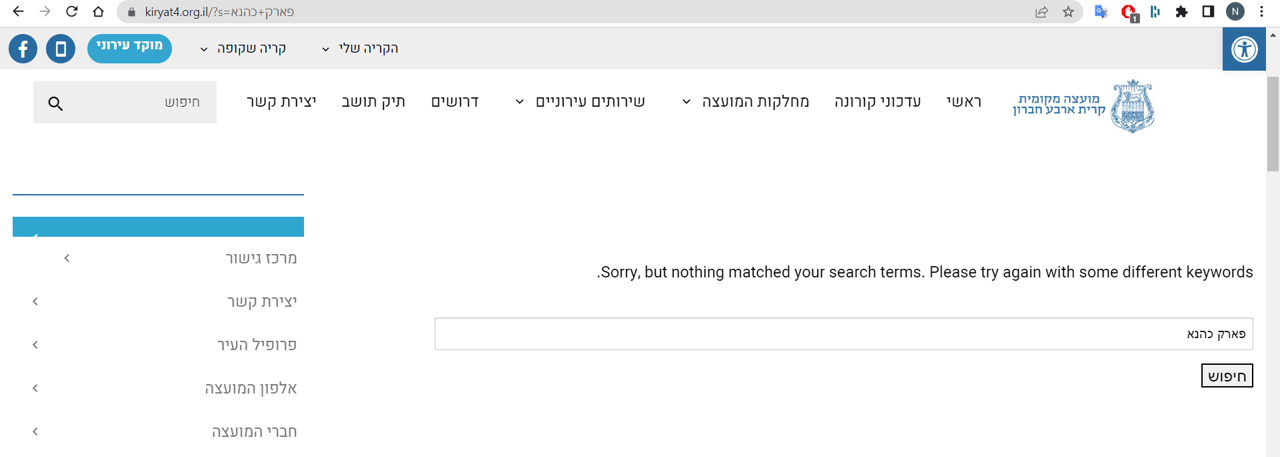 |
| I've even searched for the 'famous' Kahane Park on the Kiryat Arba Council website. No trace of it... |
But here’s the catch: try googling “Kahane Park, Kiryat Arba”; all you'll find is a tweet by... Yachad; and a couple of pictures uploaded by similar organisations. Better still, go to Google Maps and search for a place called Kahane Park, Kiryat Arba. You'll be taken, instead, to the Cave of the Patriarchs/Al-Ibrahimi Mosque. Now search for any other park, including in the West Bank ‘settlements’. Try for instance the Ze’ev Jabotinsky Park in Ariel; or the Hazon Yosef Park in Betar Illit – both very easy to find, as are dozens of others. You can even find a park in Kiryat Arba – it's called Technology Park. Yet you will not find a ‘Kahane Park’ either in Kiryat Arba or anywhere else in Israel. Officially – and insofar as most Israelis are concerned – it does not exist.
Of course, the town of Kiryat Arba does indeed have a park; and local extremists do indeed call it ‘Kahane Park’. But that’s where the facts end and the malicious insinuations of Lee Harpin/Yachad/Breaking the Silence take over.
Here’s the truth: there are people in Israel who admire Meir Kahane and think he was a great man. They tend to be the same people who think Baruch Goldstein was a misunderstood hero. How many of those nutters are there? Well, we know that, in the 1984 elections, Kahane managed to attract a whooping… 1% of the votes. Fast forward 36 years: in 2020, his disciple Itamar Ben Gvir garnered 0.4%. It’s true that this is still almost 20,000 nutters; but it’s also true that – despite all the harping – the extreme right in Israel gets much less popular support than it does in several European countries. Even after a century of conflict!
The vast majority of Israelis do not commemorate Meir Kahane. The harpins' focus on a tiny extremist fringe is deliberately misleading. It aims to create a false image. It's a lie.
Bad, bad Israel! Bad, bad Jewish schools!
But let’s go back to Lee Harpin’s text:
“Under the 1997 Oslo agreement, signed by Israel and PLO, Hebron was divided into two areas: H1 and H2. Responsibility for security and civilian matters in H1 – where most of the Palestinian residents of Hebron live (about 115,000 at the time, now about 166,000) – was formally handed over to the Palestinian Authority as was done in all other West Bank cities.
As for H2, Israel retained responsibility for security matters there, and the Palestinian Authority received authority only for civilian matters relating to local Palestinians. About 32,000 Palestinians and 800 settlers now live in H2.”
The Oslo Agreement was, of course, concluded in 1993, not 1997. The Taba Agreement (sometimes called Oslo II) – in 1995. Both were signed by Yitzhak Rabin and Yasser Arafat and neither dealt specifically with Hebron. What was concluded in 1997 was the Protocol Concerning the Redeployment in Hebron. Benjamin Netanyahu isn’t seen as your typical land-for-peace type of guy, but he was the Israeli prime minister who negotiated that particular agreement – by which Israel relinquished control over the vast majority of the city, handing it over to Arafat. In return, the latter solemnly promised (again) to rid the Palestinian National Charter of all the passages that denied Israel’s right to exist; to fight terror and prevent violence; to prohibit incitement and hostile propaganda; to combat systematically and effectively terrorist organisations and infrastructure; to apprehend, prosecute and punish terrorists; to confiscate all illegal firearms… Needless to say, Israel (under the ‘hawk’ Netanyahu) withdrew from every inch of H1; the Palestinian Authority (under Arafat and his successor Abbas) broke every one of its commitments above. But you won’t hear about that at all from the likes of Harpin, Yachad and BtS!
No, the harpins of this world aren’t really interested in agreements and law – unless as a cudgel to beat Israel with. They’re interested in ‘human stories’ – provided those make Israel look bad.
“In the city centre we speak with Mohamed Fakhore, a Palestinian business student in his 20s, about life in Hebron under Israeli military control.
‘We want the world to know what is happening here,’ he says. ‘I will be arrested if I step there,’ he says, pointing to the floor five metres in front of him. ‘I have been arrested for this one time before.’
It is heartbreaking to realise Fakhore cannot continue walking alongside us. Strict separation rules mean as a Palestinian is not [sic!] allowed to walk on the same road we all can.
Later, in one [sic!] the few Palestinian souvenir shops still open in downtown Hebron, an elderly store owner, who pours us all coffee, explains that his own wife is unable to visit him at work as a result of the separation policy in operation.
It is, he says, a ‘humiliating’ situation.”
It is mindboggling that the harpins can pretend to want ‘two states’ – but also declare it “heartbreaking” when a border is enforced, separating Israeli-controlled areas from Palestinian-controlled ones. No, these are not “strict separation rules”, but the provisions of an agreement signed between the parties – with the purpose of reducing friction and disentangling Israel from Palestinian lives.
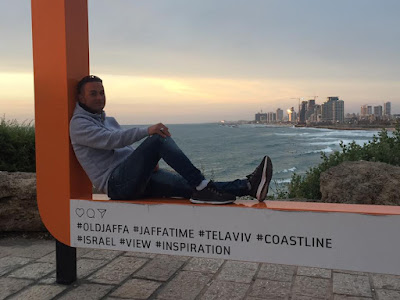 |
| Apparently the 'strict separation rules' that Lee Harpin complains about aren't quite so strict: here is Mohamed Fakhore having a fun day in Tel Aviv-Jaffa. |
It is also no doubt “heartbreaking” that the shop owner’s wife cannot visit him at work on the Israeli side of the city; but I wonder: can Jews own and operate businesses in the Palestinian part of Hebron?
Incidentally, Israeli right-wing extremists also don’t like the partition of the city: they’d like to roam freely through all Hebron and cause mischief. Extremists of all tinges – unite!
But, while imperfect, inaesthetic and a rich topic of hostile propaganda by Harpin/Yachad/BtS, the Hebron Agreement does what it was meant to do: it saves lives and allows the two communities to run their affairs independently – as much as possible in the difficult circumstances created by conflict, violence and the accompanying mistrust. Don't take it from me --ask the Mayor of Hebron. His Message (published in Arabic and English on the municipal website) contains of course the obligatory anti-Israel rant. But ultimately it says:
"Since 1996, the city has witnessed several dramatic developments after the numerous decades of continuous Israeli occupation. Due to the Oslo agreement and the establishment of the Palestinian National Authority, the city was liberated and able to embrace a form of security and calm environment. These agreements allowed the Municipal Council to develop a comprehensive management development plan, accompanied by a strategic plan, for the reception of the twenty-first century. Indeed, the Hebron Municipality office, through its own efforts and the support of many friends and partners from around the world implemented a multitude of infrastructure projects, which has had a major impact in promoting domestic and foreign investments in the city. Additionally, it is crucial to achieving the revitalization of the boom in the economic, commercial, industrial, agricultural and urban life."
You won't hear that from Harpin; or from BtS, or from Yachad!
Instead, Harpin’s hatchet job ends with the usual indoctrination ‘spiel’ that BtS and Yachad dish out to unsuspecting, naïve Western kids: there are more IDF soldiers than ‘settlers’ in Hebron (as if Palestinian terror and violence did not exist); an interview with some extremists who ‘want it all’ because ‘it was promised to Abraham’ – as if this is why the vast majority of Israelis want the IDF to stay in Judea & Samaria.
Finally, Harpin gives the floor back to Amir Ziv, who utters the following outrageous lie:
“The bottom line is the Palestinian Authority has the freedom to do what we allow it to do.”
Among other egregious acts, in recent years the Palestinian Authority complained to the International Criminal Court (in blatant breach of its obligations under international agreements it signed), alleging that the IDF committed ‘war crimes’ and ‘crimes against humanity’. Is that something that “we” would allow – if we had the power to stop? Would we allow PA’s ‘pay-for-slay’ policy – wages paid to convicted terrorists and subsidies to the families of suicide bombers? Would we allow the despicable indoctrination to hate and violence that goes on in Palestinian Authority schools?
Let me give you just a couple of examples of this latter phenomenon – arguably the biggest obstacle to peace.
The Year 5 Arabic Language textbook used in Palestinian Authority schools teaches the following:
“Our Palestinian history is brimming with names of martyrs who have given their lives to the homeland, including the martyr Dalal al-Mughrabi. Her struggle portrays challenge and heroism, making her memory immortal in our hearts and minds. The text in our hands speaks about one side of her struggle.”
Touching; except that Dalal al-Mughrabi (a member of Arafat’s Fatah movement) took part in the 1978 Coastal Road Massacre. 11 Palestinian and Lebanese terrorists landed on Israel’s Mediterranean shore near Tel Aviv. The ‘heroic’ Dalal started the day by murdering an unarmed Israeli woman she happened to find on the beach. She and her mates then proceeded to murder another 38 Israelis (all but one unarmed, uninvolved civilians), including 13 children.
The Islamic Education textbook for the same age group teaches that the Western Wall (which it calls Al-Buraq Wall)
“is part of the western wall of Al-Aqsa Mosque, and the al-Aqsa Mosque, including the Wall, are Palestinian land and an exclusive right of the Muslims.”
Coming back to Dalal Al-Mughrabi: in 2017, the (not very Israel-loving) Belgian government had to freeze funding to the Palestinian Authority when it discovered that an elementary school for girls they funded in the West Bank was named after that 'martyr'. Nothing like giving little girls a true hero to emulate, huh?
 |
| The logo of the Dalal Al-Mughrabi Elementary School for Girls shows her stylised photo superimposed on the map of 'Palestine,' including Israel. The message is clear... |
By the way, the school is located in Bayt Awwa, just a few minutes away from Hebron. But I don't suppose Amir Ziv includes it in his indoctrination tours. Though it may be a brilliant opportunity to wax lyrical about what "we must fix"!
The harpins, of course, are not at all concerned about all this. Quite the opposite: what really bothers them is
“the one-dimensional pro-Israel teaching [in] Jewish secondary school[s].”
Hmmm… Really? Do Jewish secondary schools in the UK lionise Baruch Goldstein, calling him a martyr and a hero and encouraging the students to keep his memory immortal in their hearts and minds? Do Jewish secondary schools in the UK teach that Al-Aqsa is “an exclusive right of” the Jews? Is there, somewhere in the UK (or the entire world, for that matter, a school named after Baruch Goldstein??
'Intellectual' child abuse
I left the worst for last: arguably the only truly heartbreaking aspect of Lee Harpin’s screech is when he decides to bring his daughter Ruby into it. Presumably, she is bothered by the fact that her “social media is flooded with ‘Free Palestine’ propaganda”, so she “insisted” to go on that BtS/Yachad indoctrination tour.
Except that, just a couple of paragraphs further on, we find Ruby and her ‘delightful’ dad attending a “Palestine demo”; that is, one of those ‘protests’ at which slogans like ‘Free, free Palestine!’ and ‘From the River to the Sea, Palestine will be free!’ are par for the course; and where one so often finds flags and symbols of terror organisations alongside antisemitic banners and slogans, some amounting to overt calls for genocide and ethnic cleansing.
As history teaches us, young people are particularly vulnerable to brainwashing and indoctrination. I’m afraid that youngsters like Ruby belong in the same category as the Palestinian students: both are cynically being used as political cannon fodder by unscrupulous adults with an ideological axe to grind. If we are ever to stop the bloodshed and make peace, then children and youngsters – both Jewish and Arab – must be protected from this form of 'intellectual' molestation.
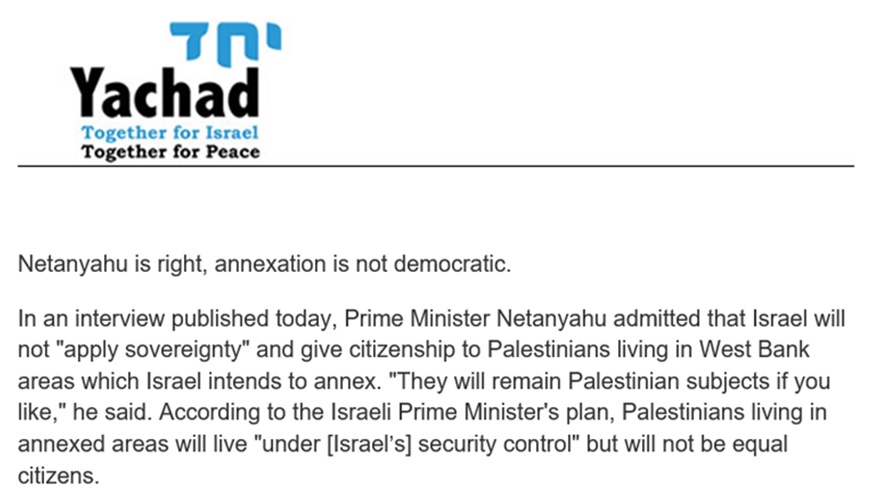
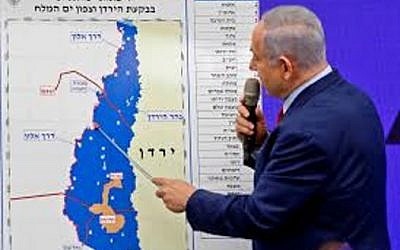
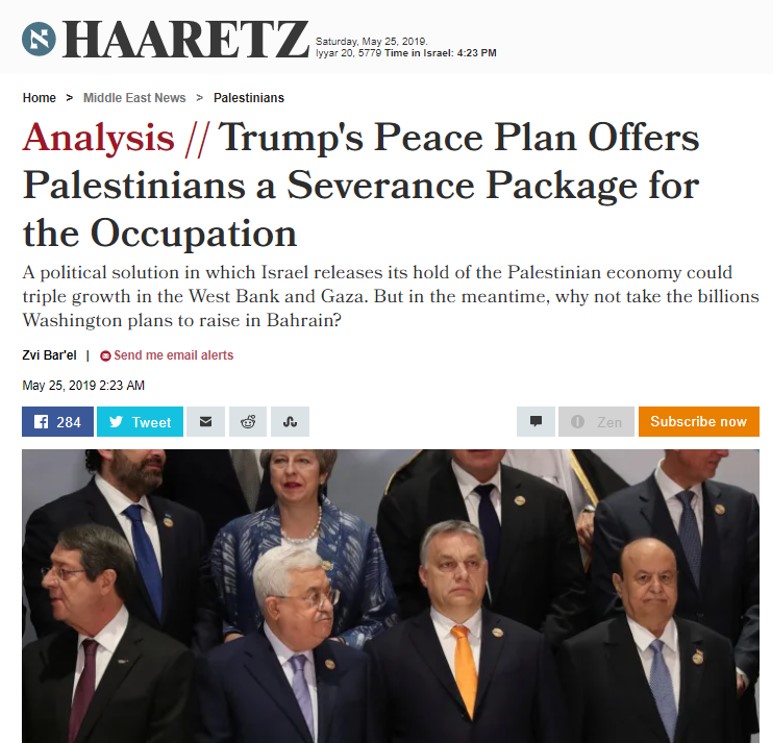
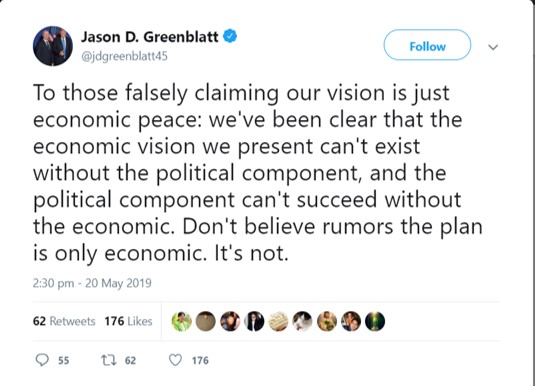
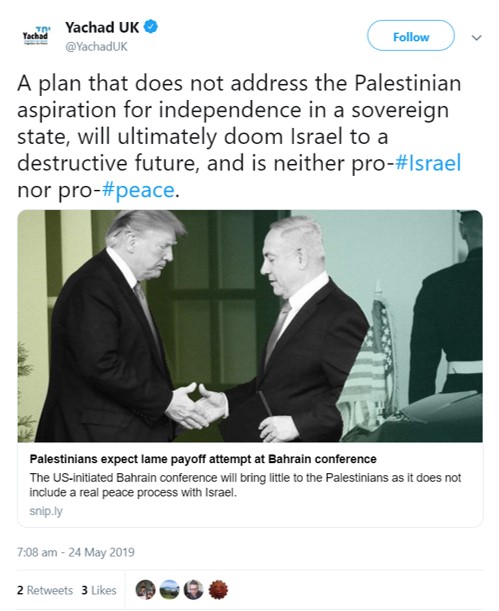









- Follow Us on Twitter!
- "Join Us on Facebook!
- RSS
Contact